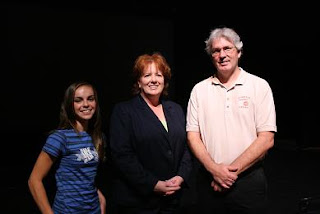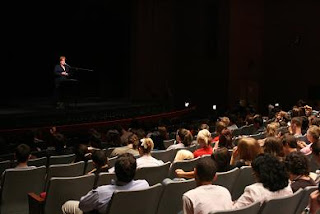I first began planning an event for the National Week of Action about a month in advance. I set my sights high, planning for two events—one on the main campus and one at the Downtown Campus of Binghamton University. I wanted each to be about an hour or two long with various activities and raffles. I also wanted to involve the community in some way. I didn’t realize at the time, but I set a very unrealistic goal for myself.
As the National Week of Action drew closer, I met with Citizen Action to organize these events. I figured with their help I could easily pull off two events. Upon meeting with them, we talked it over and decided on pooling all our resources for one event at the
So, with the help of Citizen Action and my group members, we designed an event that would be a sort of information session/press conference regarding Clean Money. I went to the
After this initial step, I moved on to organizing the food, fliers, and materials for the tables. I coordinated with Citizen Action to split up some of the planning tasks. I would be in charge of spreading the word to students and getting them to attend and Citizen Action would work on creating interest within the community, the media and with local politicians.
To publicize the event on campus, I felt it important to pass out fliers and put an ad in the school newspaper. The ad ran on the Tuesday two days before the event, and the day before the event my group and I passed out over 250 fliers around campus. It was hard not to get discouraged by the mass apathy of the student body. However, it was encouraging to think that if even five out of the hundreds of people we talked to came to this event it was a success. I set my goal low. I decided I would be happy with 20 people total at my event. The room was sort of small and could look decently filled up with 20 people. I also envisioned people continuously coming and going.
On Wednesday, the day before the event, I went to take care of the food preparations. Food would be my biggest draw with the students, and I knew it had to be done right. With funding from Democracy Matters and Citizen Action, I was able to get subs and pizza. Citizen Action enlisted the help of a local politician, Barbara Abbott King, and had local news channels agree to cover the event.
On the day of the event, I arrived at the Downtown Campus two hours early to make sure everything went smoothly. I was concerned that students would not come from the main campus, which is kind of far from the Downtown Campus. It was also raining, and I thought that might keep some people away. My fears were never realized. The event went great. I’m not too sure how many students actually came from the main campus all the way to the Downtown Campus, but I did see a few students come in holding the fliers I passed out the day before. It also worked out perfectly because we planned on starting the event just as classes let out at the Downtown Campus and many people got out of class hungry and eager to have some free food.
The media covered the event, interviewed me and covered our press release.
http://www.wicz.com/fox40/
Barbara Abbott King really helped out with speaking on the issue of Clean Money and how it shaped her experiences running for office. Most of the food was eaten and everyone seemed to have a great time talking about Clean Money. I spoke to a few students about Clean Money as well and saw tons of people taking handouts, signing petitions, signing letters to politicians, and supporting our cause.
Dave Ugelow
Campus Coordinator
SUNY Binghamton




